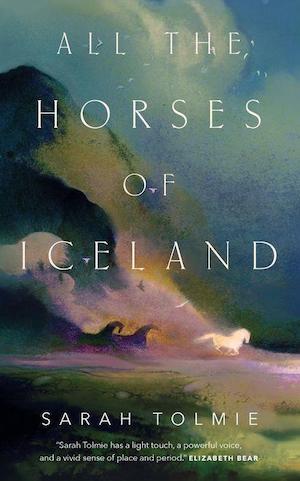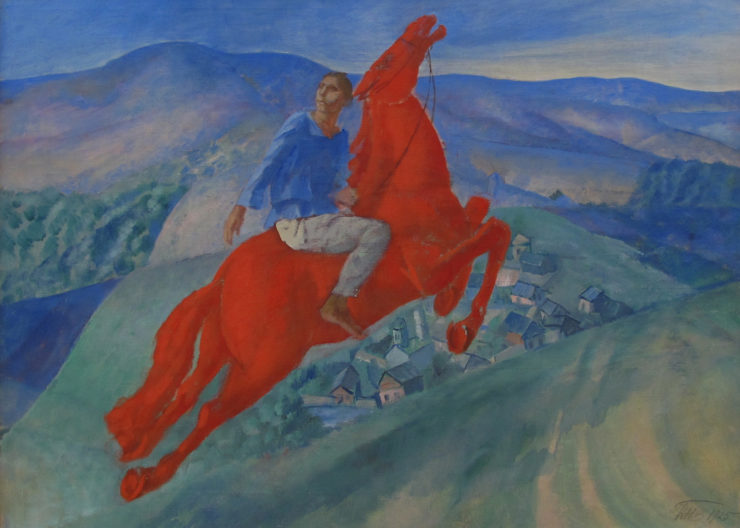As I was wrapping up my other long-running series, the Andre Norton Reread, I mentioned a theme that’s been niggling at me for a while. That is the way in which Norton’s horse-savvy collaborator, Lyn McConchie, portrays horses as opposed to the magical and, at least physically, horselike Keplians. I mentioned in my post that I’ve seen this before in another favorite author’s works, in Anne McCaffrey’s Dragonsdawn, when the horse trainers become dragonriders. Once the fantasy creatures take over, the horses get dropped cold.
Of course there all kinds of reasons and excuses. Dragons are predators on steroids, and herd animals are their natural prey—and the “runnerbeasts” of the early books get retrofitted to become slightly mutated descendants of the original colonists’ horses. Of course once you become a dragonrider, you have to abandon your horses for their own safety. Otherwise they’ll get eaten.
Keplians aren’t anywhere near as deadly as dragons. Their problem is that they are highly intelligent, well up along the human scale and possibly beyond it, and they have nothing but contempt for poor, stupid, non-telepathic horses. Naturally once our heroine bonds mentally with the Keplians, she’ll still use the pony she rides for most of the book, but she’ll be fully focused on the big, shiny, spectacular, very smart magical beings.
This is not an uncommon theme. Mercedes Lackey’s Companions look like horses but are actually magical creatures of great power and high intelligence. Horses are essential transport in Valdemar, but mentally and emotionally, they just can’t keep up.
I love horse-adjacent magical beings. I adore the unicorn in Peter S. Beagle’s The Last Unicorn, and was just as horrified as she was when the would-be-helpful wizard turned her into a human. When I was a teen I wanted to be a dragonrider. I was on Team Pooka in Emma Bull’s War for the Oaks, and if The Key of the Keplian had existed at the time, I would happily have signed on to Team Keplian, too. As for Companions, well, I managed to end up with the our-world equivalents.
And that’s where I start to pull the whole train up short. For a long time I bought into the idea that horses are nice and all that, but dragons and Keplians and Companions are nicer. Bigger. Fancier. Shinier. And much smarter. They can talk to you. In your mind, yes, but they use words and they carry on conversations.
I see the attraction, and also the frustration. Humans in general are highly verbal and very much invested in the power of spoken language. I remember the often acrimonious debate over whether sign language for the Deaf was even a language. A language is spoken, the opposition declared. Humans speak, and that speech is what distinguishes them from animals. (The implication about the Deaf was not subtle.)
There’s a long tradition in literature of animals that talk. Either they’re just assumed to be doing it, or they’re endowed with human speech through magic or divine intervention. Beast fables feature animals acting and talking like humans, with human culture and institutions. The story may feature a fox or a rabbit or a lion or a donkey, but the viewpoint—the gaze, we might say—is always human.
Actual real animals of course do not talk, except some birds (and there’s much debate there as to whether they understand what they’re saying—hence the word “parroting” which means “repeating words or ideas without comprehending their meaning”). This is frustrating for humans who would like to be able to explain things. Or have things explained to them instead of having to guess.
Hence, in fantasy, the favorite trope of the telepathic animal companion. The vocal apparatus may not be suited to human speech, but talking mind to mind solves the problem. Quite often then, because humans value intelligence, or at least human-like intelligence, the fantasy animal will be capable of human-level thought and reason as well.
I don’t have a problem with that. It’s fantasy. If we want to carry on a conversation with a dragon or a unicorn or a Keplian, why shouldn’t we? These are great characters, lovingly and carefully drawn, and the relationship between them and their humans is one of the best things about the books and stories they appear in.
I start to have a problem when the fantasy animal is compared with a non-fantasy animal, and the non-fantasy animal suffers in the comparison. Oh, says the author through their characters, we love our regular animals, but they’re just not as awesome as our fantasy animals. Poor things, so dull and plain and ordinary, and really, they’re not very bright. They can’t talk to us the way our fantasy animals can.
And then our fantasy characters dump their poor stupid boring animals. Or use them and exploit them but be all about the fantasy animals, the way the pony is treated in The Key of the Keplian. For all his good and loyal service, he gets a life of hard labor. Then he’s dropped by the wayside when the human he’s served so loyally is permitted to ride the Keplians.
I will give McConchie one thing. She takes to heart her mentor and collaborator Norton’s fascination with alien intelligence, and tries to show us how alien the Keplian mind is and how much of a stretch it is to communicate with it. That’s nice worldbuilding. But for all her visible knowledge of and affection for horses, she doesn’t make the same effort with the horse.
Buy the Book


All the Horses of Iceland
Our understanding of animal intelligence has advanced quite a bit in the decades since the novel was published. Science is developing a broader and deeper understanding of how, and how much, animals think. There’s still a tremendous amount of study to do, but indications are that animals are smarter than we used to think. Maybe it’s not the same kind of smarts as ours, but it’s there, sometimes to a much higher degree than we suspected.
Horses have tended to be classed as not very bright. They’re prey animals; they spook at shadows. They live in the moment. They don’t think ahead. You can love them and admire them for what they are, but when it comes to basic smarts, they’re not up there with, say, dogs. And for fantasy purposes, they can’t talk to you in your head. They’re not capable of it.
That’s what the McConchie’s horse is like. Sweet, loyal, hard-working. No question. But there’s not much going on in his head. Not like the snapping flying synapses of the Keplians.
So of course, once the protagonist gets to know the magical animals, she keeps on using the horse as transport, early, often, and every day, but she never tries to see if her expanding mental powers might actually work with him. She doesn’t even think of it. She’s concluded from the start that he’s not capable of it.
Same thing happens with the proto-dragonriders in McCaffrey. They’re expert and dedicated horse trainers, but the horses don’t have an inner life to speak of. Sure, it’s dangerous for them to be around the dragons, and they are completely freaked out by the giant flying predators. And yet there’s not enough regret on the part of the trainers. Not enough grieving, maybe, that horses are closed off to them by their connection to the dragons. Nope, it’s that meme that’s all over the interwebs, the guy walking down the street with his girlfriend and turning away from her to whistle at the passing (and nearly identical) random human female.
In the dragon universe, humans who don’t or can’t bond with the big ones can take the consolation prize of one or more fire lizards. That’s very cool and I wouldn’t mind one myself, but there are horses on this planet. McCaffrey was a horse person, very much so; she lived on a horse farm in Ireland. But even Piemur’s pony-zoid is called Stupid and is anything but bright. It’s played for comic relief, not as a true animal companion.
Maybe, as we understand animal cognition better and learn to respect it more, we’ll respect our real-world animals more in fantasy settings. By all means, bring on the dragons and the Keplians, but give the horses their due, too. Find ways to balance the shiny new fantasy animal and the boring old real animal—who isn’t really boring at all, if we just let ourselves see it.
Judith Tarr is a lifelong horse person. She supports her habit by writing works of fantasy and science fiction as well as historical novels, many of which have been published as ebooks. She’s written a primer for writers who want to write about horses: Writing Horses: The Fine Art of Getting It Right. She lives near Tucson, Arizona with a herd of Lipizzans, a clowder of cats, and a blue-eyed dog.










